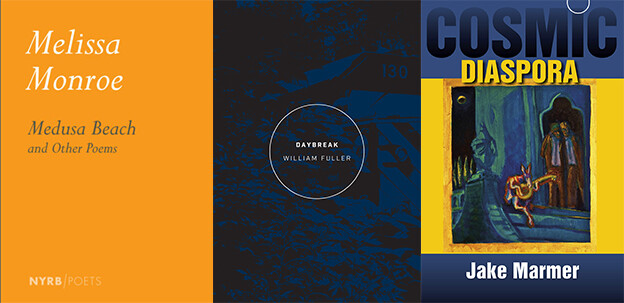
The human universe
Kendall Owens

Editorial assistant Kendall Owens reviews three strange, experimental poetry titles in this set of capsule reviews.
Medusa Beach and Other Poems, Melissa Monroe (NYRB, 2020)
Monroe employs a variety of styles and subjects in her exploration of how humans project themselves onto the world: from an imaginary planet defining itself, detailing the advantages of being imaginary and the simultaneous joy and pain of being known (“being observed / forced you to take positions / you might regret”), to Pinocchio’s bitter musings on the reality of being human (“You wished yourself out of your fairy tale, friend. / Whose fault is it if you forgot to read / the fine print?”). Monroe’s poetics are at times comically witty, at others surprisingly scientific, but always unapologetically and laudably strange. The titular poem, “Medusa Beach,” explores humanity’s historical and contemporary relationship with the idea of individuality, drawing from both the mythological Medusa and the real-world medusae. “Practice your role / as ‘an insignificant part in an all-embracing world-soul,’” Monroe writes, encouraging readers to embrace our “jellyfish” nature. “It’s pleasant to be a floating oxymoron, or less.”
Daybreak, William Fuller (Flood Editions, 2020)
William Fuller’s Daybreak is a subversive collection of abstraction interspersed with sudden jolts of reality written through poetic prose interspersed with poetry. Fuller leads readers on a twisting, illusory trail of metaphor, delving so deep into the abstract that reality becomes alarming. Fuller’s imagery falls into distinct categories: strange (“This morning I caught a single thought, coaxed from the / end of a pencil, only to watch it dissolve for lack of discipline”); bizarre (“Birds arrive from Jupiter … A bear on a bicycle rides by”); and something wholly unique to Fuller (“Components once belonging to sensation had set out on their own to create new blends that they aged in glue pots under a ledge.”) Yet within Fuller’s complex reality are notes of simplicity, as he files everything down to its base components: life, time, and the universe itself.
Cosmic Diaspora, Jake Marmer (Station Hill Press, 2020)
Reading Cosmic Diaspora is reading music, as it takes on all of the qualities of improvisational jazz found in its accompanying album, Purple Tentacles of Thought and Desire. Speaking from experience as an immigrant from “the outskirts of the universe — provincial Ukrainian steppes,” Marmer describes how immigrants are stripped of their culture and molded into less “alien” beings: “they lawyered me out of my alien appearance / though couldn’t fix the accent.” Almost whimsical stories about Marmer’s “home planet,” where people seek therapy from purple rocks, are intertwined with stark truths of the discrimination so-called “aliens” face in America. Marmer inverts this narrative, treating readers as the strange otherworldly beings: “Perhaps I never understood the depth of attachment / you folks have to your bodies.” Throughout the collection, influences of Jewish religion, myth, and ritual combine to create an experimental performance that sings from the pages.